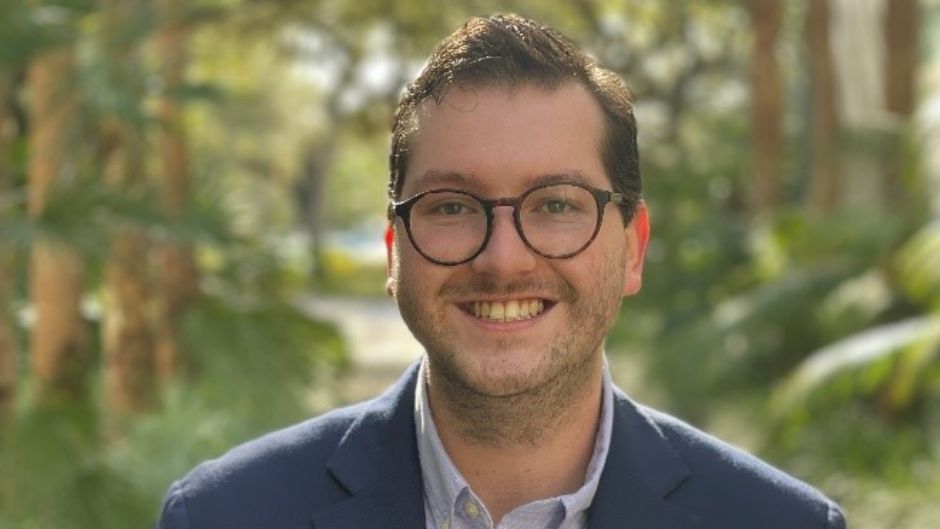The directors of the University of Miami School of Law clinics have conferred the 2022 Markus Award on Benjamin Brooks, a rising third-year student, for the exemplary work he did in the Immigration Clinic.
“Ben excelled in his work, was the consummate team player, and brought much-needed humor and positive energy to the clinic. I’m thrilled that Ben has agreed to return to the clinic next year as a student fellow. In his new role, he will serve as a mentor to students taking the clinic for the first time,” said Rebecca Sharpless, director of the immigration clinic and associate dean for experiential learning. “We are grateful to the Markus family for the opportunity to honor Stuart Markus and for their support of our clinical program.”
Award named for empathetic alumnus
Miami Law alumnus Stuart Markus began practicing law in Miami in 1958 and worked as a trial attorney for 55 years. He was well-known for representing the “little guy,” often without accepting a fee. He was “the last small-town lawyer in this big town,” said Miami-Dade Circuit Judge Milton Hirsch, a longtime friend. After his death in late 2013 at age 81, his family established the Markus Award at Miami Law, which recognizes a student each year for outstanding work in one of the law school’s in-house clinics.
“My dad practiced law in Miami for over 50 years,” said son David Markus, a well-known South Florida defense attorney. “Throughout his career, he fought hard for his clients in every area of the law. He never turned away a person in need and helped countless people with practical, hands-on advice and representation that went far above and beyond the norm.
“My wife, Mona, and I established the Markus Award to honor a student who shares that caring spirit, and who has made a meaningful difference in someone’s life – which is something my dad did every day,” said David Markus. “Ben embodies the mission of the award.”
“I am extremely honored to be receiving the Stuart Markus award, an award named after a man that is known throughout Miami as ‘fighting for the little guy,'” said Brooks. “Participating in the Immigration Clinic was truly a life-altering experience. The clinic gave me a chance to hone my advocacy skills. Dean Sharpless and Judge Lerner provided countless opportunities for me to help clients seek the justice they undeniably deserve. I look forward to joining the Clinic again next year as a clinical fellow and I am excited to continue all our pro bono work with current and new clients.”
Brooks excelled in both the casework and class parts of the immigration clinic. In the fall, he took on some of the hardest legal writing projects in the clinic, including the analysis of whether there was a legal basis for a habeas petition for a person jailed in an immigration detention center. With his partner, Brooks also drafted and filed a petition for writ mandamus to force the immigration agency to process a case languishing in their backlog.
Near the end of the semester, he volunteered to take on more work on the case of a detained Mexican woman who suffered from mental illness. This case came to the clinic near the end of the semester and required a lot of fast-paced work. In class, Brooks made valuable contributions to the discussion and forged strong working relationships with all students in the clinic.
This spring, Brooks and another clinic partner were tasked with representing a Haitian woman who had been held at Guantanamo in the early 1990s after she had been interdicted at sea. The students argued that their client was a derivative asylee because she was part of the family unit when her deceased husband was granted asylum. The case required Brooks and his clinic partner to travel to Tampa to prepare their client in her house and then represent her in an interview at Tampa's Asylum Office.
Brooks was also a driving force behind the clinic's trip to Baker County Detention Center, located west of Jacksonville. Due to the closing of Glades County Detention Center in Moore Haven, Baker jail is now where many immigrants, including women, are held. Brooks and his partner arranged the entire trip and secured student activities funding for six students to go on the trip with the clinic director. After the trip, the students, including Brooks, organized the information gathered from questionnaires about detention conditions into a spreadsheet that now forms the basis of coalition work to improve conditions at the jail.
Read more about Miami Law’s clinics
More about Immigration Law at Miami Law

